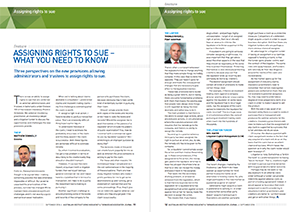Assigning rights to sue – what you need to know

Assigning rights to sue – what you need to know
Download PDF ArticleThree perspectives on the new provisions allowing administrators and trustees to assign rights to sue.
There is now an ability to assign rights to sue that are conferred on external administrators and trustees in bankruptcy under Division 100 of the relevant Insolvency Practice Schedules. We asked an insolvency practitioner, an insolvency lawyer and a litigation funder to discuss the opportunities and challenges the new provisions provide.
The IP
MATTHEW DONNELLY – Deloitte
Early on, these provisions were thought to be a great idea – making something possible that was otherwise impossible or difficult. But as we’ve unpacked the practicalities of the process, our view has changed. We’ve realised there are several significant challenges and it’s not exactly a quick avenue to an asset realisation.
When we’re talking about claims available to a liquidator – preferential claims and insolvent trading claims – my first challenge is estimating what the claim is worth.
If I assign a right to an action, I have to be able to justify a transaction value. That’s an inherently difficult thing to put a price tag on.
To understand the value of the claim, I need to estimate the probability of success of the claim and the likely award if the claim is successful.
Both these figures are extremely difficult to estimate reliably.
So, when it comes to a valuation, I’ve got a real problem in terms of describing to the creditors why they should or shouldn’t transact.
However, if I pursue the claim myself, or pursue it with a litigation funder, then we’re just taking a general commercial risk and I never have to crystallise that in terms of a transaction. All I have to do is justify the investment we’re making in pursuing it.
Another significant challenge is around providing some of the books and records of the company to the person who purchases the claim, because obviously they’ll have some kind of evidentiary burden in pursuing their claim.
Should I simply provide them with copies of the books and records or do I have to cede the books and records? Would the assignee like to avail themselves of the powers of a liquidator which include the powers of public examination? If so, how do I contract with a commercial agent to use my liquidator’s powers? Am I stretching to an improper purpose by doing that?
The decisions made at this point can create future jeopardy for me as well as diminish the price someone is willing to pay for the claim.
For these and other reasons I’m inclined just keep it simple and do it the old-fashioned way in the majority of these situations. There are now many litigation funders who make it pretty painless for me to get some examinations up and running, get a statement of claim written and file some proceedings. Plus, they’ll give me an indemnity against adverse cost orders and they only get paid if the claim is successful.
The Lawyer
THOMAS RUSSELL – Piper Alderman
There’s often a complaint whenever the legislature tries to change anything that they make simple things incredibly complex. In this case they’ve done the opposite. They just haven’t gone far enough and made the consequential changes that are necessary to give effect to the legislative intention.
These new provisions were touted as being a great reform, but in reality, there are some fundamental problems with them that means the existing way that people have always done things is still regarded as being the most desirable and safest way to do it.
The main problem is that there is the ability to assign legal actions, which are statutory actions, in circumstances where the statutory provision still requires that the remedy go to the company, and there’s no ability to assign the remedy.
You end up in a position where a third party has been assigned the right to pursue an action, but, by law, the remedy still has to be given to the company.
So, a liquidator cannot simply assign the action and then finalise the winding up. In these circumstances, if the assignee wins the action, the money gets paid to the liquidator, who has to keep the job open the whole time so that he or she can receipt the money and pass it back to the assignee.
That leads into the secondary drafting problem, or at least an omission from the legislation, which is that there is no protection in the legislation for a liquidator who has assigned such an action against a claim against him or her for having made the decision to assign the action.
This means that, if you have a disgruntled – and perhaps highly unreasonable – target of an assigned right of action, then he or she will have an avenue to criticise the liquidator or to throw a spanner in the works in the claim.
If liquidators are going to seriously consider assigning a right to sue, it’s also important that they get advice about the other aspects of the deal that they should be negotiating at the same time to protect themselves. Protecting themselves is also obviously protecting creditors, because any cost that the liquidator ends up incurring will ultimately be borne by creditors.
The deed of assignment should contain all kinds of provisions to make certain things clear.
For example, if there’s an insolvent trading claim against a company director and the director cross-claims against the liquidator on some basis and the liquidator has to incur legal costs, has the assignee of the claim agreed to indemnify the liquidator for costs incurred? This is a huge issue in circumstances where the costs of pursuing an insolvent trading claim often reach into the hundreds of thousands.
The Litigation Funder
NEIL KAFER – Litigation Capital Management (LCM)
The recent changes created by the Insolvency Law Reform Act have opened up opportunities for third parties to acquire claims as an alternative to funding claims. So, who might participate in this new market as a potential acquirer of claims?
Defendants might acquire a claim in preference to settling it – in order to ensure that some other party doesn’t acquire it and pursue it. Guarantors are another party who might purchase a claim as a protective measure. Competitors of a defendant might acquire a claim in order to cause business disruption. And then there are litigation funders who are perhaps a more obvious choice of assignee.
An advantage for a litigation funder in taking an assignment of a claim (as opposed to funding a claim), is that the funder gains greater control over the conduct of the litigation. The same risks still apply however, and funders will naturally do their due diligence around the merits of the claim and recoverability.
As the market opens up for the assignment of statutory claims, insolvency practitioners need to remember that certain investigative powers are conferred on them that are not available to potential assignees. So, they may need to undertake a degree of initial preparatory work on a claim in order to make it easier to sell the product.
Download PDF Article


